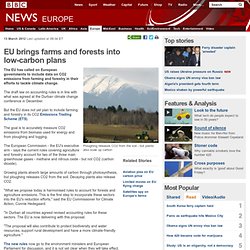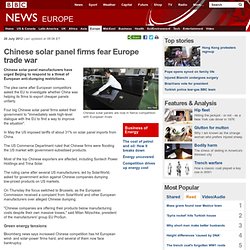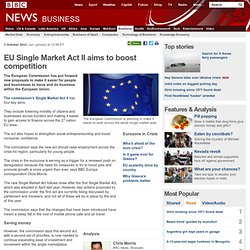

EU brings farms and forests into low-carbon plans. 13 March 2012Last updated at 09:34 ET Ploughing releases CO2 from the soil - but plants also soak up carbon The EU has called on European governments to include data on CO2 emissions from farming and forestry in their efforts to tackle climate change.

The draft law on accounting rules is in line with what was agreed at the Durban climate change conference in December. But the EU does not yet plan to include farming and forestry in its CO2 Emissions Trading Scheme (ETS). The goal is to accurately measure CO2 emissions from biomass used for energy and from ploughing and logging. The European Commission - the EU's executive arm - says the current rules covering agriculture and forestry account for two of the three main greenhouse gases - methane and nitrous oxide - but not CO2 (carbon dioxide).
Growing plants absorb large amounts of carbon through photosynthesis, but ploughing releases CO2 from the soil. "In Durban all countries agreed revised accounting rules for these sectors. EU should commit to tougher emissions target, say MPs. 24 July 2012Last updated at 20:40 ET By Richard Black Environment correspondent, BBC News Many poor countries see the 2015 deal as legally binding, not voluntary The EU should vow tougher action on climate change to maintain political leadership, says a committee of MPs.

The Energy and Climate Change Committee report also says the UK government must aim to end fossil fuel subsidies and raise energy efficiency, saving money. But it has come under fire for saying a prospective new UN emission-limiting deal, due in 2015, is "voluntary". Meanwhile, the European Commission is set to unveil proposals to make the EU carbon market more effective. The price for carbon "pollution permits" in the EU Emission Trading Scheme (ETS) has been bumping along at about seven euros per tonne, which analysts agree is far too low to stimulate meaningful investment in clean technology.
The Energy and Climate Change Committee says the EU should make the change as soon as possible. Continue reading the main story. Chinese solar panel firms fear Europe trade war. 26 July 2012Last updated at 08:06 ET Chinese solar panels are now in fierce competition with European rivals Chinese solar panel manufacturers have urged Beijing to respond to a threat of European anti-dumping restrictions.

The plea came after European competitors asked the EU to investigate whether China was helping its firms to export cheaper panels unfairly. Four big Chinese solar panel firms asked their government to "immediately seek high-level dialogue with the EU to find a way to improve the situation". In May the US imposed tariffs of about 31% on solar panel imports from China. The US Commerce Department ruled that Chinese firms were flooding the US market with government-subsidised products.
Most of the top Chinese exporters are affected, including Suntech Power Holdings and Trina Solar. The ruling came after several US manufacturers, led by SolarWorld, asked for government action against Chinese companies dumping low-priced products on US markets. Green energy tensions. EU Single Market Act II aims to boost competition. 3 October 2012Last updated at 12:56 ET The European Commission is planning to make it easier to work across the whole single market area The European Commission has put forward new proposals to make it easier for people and businesses to move and do business within the European Union.

The commission's Single Market Act II has four key aims. They include fostering mobility of citizens and businesses across borders and making it easier to gain access to finance across the 27 nation EU area. The act also hopes to strengthen social entrepreneurship and boost consumer confidence. The commission says the new act should raise employment across the crisis-hit region, particularly for young people. The crisis in the eurozone is serving as a trigger for a renewed push on deregulation because the need for measures to try to boost jobs and promote growth is more urgent than ever, says BBC Europe correspondent Chris Morris. Saving money Continue reading the main story Analysis Chris MorrisBBC News, Brussels.